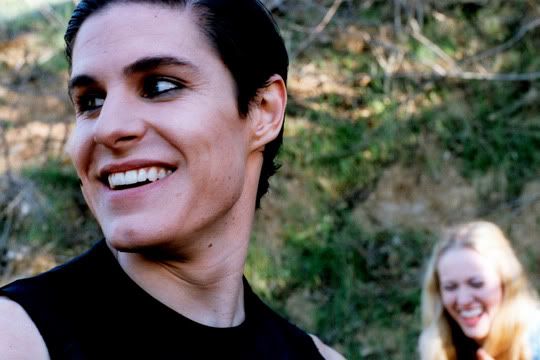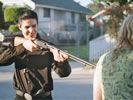Eye For Film >> Movies >> The Lost (2006) Film Review
The Lost
Reviewed by: Chris

The Lost starts like a fairy tale. Once upon a time there was a boy called Ray Pye. He put crushed beer cans in his boots to make himself look taller. We meet him with his two friends, Tim and Jennifer, in the campgrounds of a wood. Ray strolls towards a wooden toilet cubicle erected on the hill, the door opens, and a naked girl steps out, quickly apologising as she thought she and her friend were alone. The image is so startling that you know at once this will be no ordinary movie.
Ray has killed rabbits before and decides to kill the girl and her friend, to 'see what it feels like'. Tim and Jennifer, whom he dominates, are coerced into covering up. Four years later, Ray hasn't been caught, in spite of one cop who is determined to make him pay. Ray goes on to much nastier things.

If The Lost teeters on the edge of violence that is so extreme as to revolt most audiences, the question that will hover in the mind of many serious viewers will be whether the end is going to justify the content. Some will not stay that long - in the screening I went to, several people, after a section of intense and escalating violence, walked out at a point where a pregnant woman is stabbed in the back. You have to be able to stomach quite a lot, calmly to consider whether the film, in spite of this, has artistic merit. During the end credits, it says, "If you liked the movie, read the book. If you didn't like the movie, read the book." Ironically, many may not have stayed to this point.
While the film is not a masterpiece, I will argue that it does have considerable artistic merit, even if I feel slightly uncomfortable at disenchanted, gun-toting American teenagers watching it. It delivers both in style and in substance, and if censors want to intervene, that is maybe more a reflection on the people they think might be influenced by it than on its standing as new, invigorating and perfectly valid art-house cinema.
Firstly, the film gets a reaction. Not one of bored disgust - it provokes a gut feeling, it makes the audience test and question its own tolerance levels. The acting is good all round, but that of the lead character particularly memorable. His psychotic, drug-fuelled mannerisms stick in the brain like a traumatic encounter. The storyline and editing are stylish. Characters, almost in keeping with the once-upon-a-time introduction, have a two-dimensional quality like those in fairy stories, and we tend to see only traits that are essential to the plot. The characters' development does not go so far as being tongue in cheek or a caricature, but reaches an almost symbolic level where they become ciphers in a particularly challenging onslaught to the senses.
The cinematography and art direction is inventive. There will be switches to high grain film, or unnerving mixes of slow motion, missing frames and superimposed images. The bedrooms of Ray, and also Katherine, a lush whom he falls in love with, use vivid reds and blacks to create a surreal effect, and props that include a statue of a black panther. Ray wears black eye make-up, throwing himself into a Bowie-esque larger-than-life image to give himself an almost god-like appeal to the other, less dominant, teenagers. In contrast, when he finally comes clean about 'the worst thing he ever did', he is sitting dressed in black but on a pure white sofa and background. Katherine, who thinks at first she can 'handle' him, puffs languorously at a cigarette through red lips as Ray talks and she becomes sexually aroused.
Marc Senter's performance (as Ray) is like a turbine that drives the film ever faster forward. The potent soundtrack reflects a cocaine-frenzied adrenalin rush, and even the 'normal' characters offer only some queasy sense of relief. There is 60yr old Ed, for instance, who is in a relationship with teenager Sally; and Detective Charlie Schilling (Michael Bowen), who might seem crazy until you put him next to Ray. Unlike many films that try to capitalise on excessive violence, The Lost wins partly because it is not repetitive. There is nasty violence, quick violence, prolonged violence, mental torture with cruel and violent treatment, 'justified' violence and sick violence. Then there is even offhand violence - "I didn't like you anyway," says Ray as he aims and fires, killing someone with all the casual pride of a sharpshooter at a fairground. (In case you haven't guessed, there is quite a lot of violence!)
Supporting scenes draw on popular subculture for realism, such as the rush to flush drugs (grass) down the toilet with limited success when the cops try to bust a party, or the 'friend' who tries to shave an unnoticeable amount of resin from Ray's cannabis delivery. Sensuous, opulent, and recognising few limits, The Lost strains at the sequins to be a cult nasty and succeeds. Even the sex scenes throw in a level of wit not found in the average shocker. "I'm sorry that was a little fast," says Ray after fucking Katherine the first time. "I've had it faster," she retorts nonchalantly.
While featured songs such as "Drink, Fight, Fuck," might sum up the superficial ethos of the film, it rises well above the trailer-trash slasher that it could easily have become. More concise and elegant than Freeway, more intelligent and visceral than Natural Born Killers, demonstrating a considerable array of talent in its determination to shock that was so noticeably absent in The Great Ecstasy of Robert Carmichael, less high-brow than Irreversible, and more hypnotic than American Psycho. The Lost, however repugnant many people will find it, lives up to its promise of being controversial and worthy of attention by all lovers of the genre.
Reviewed on: 08 Sep 2006

















